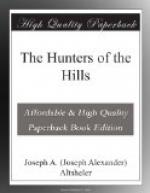When Tayoga passed through a forest it was not merely a journey, it was also an inspection. He had been trained from his baby frame, gaoseha, always to observe everything that met the human eye, and now he not only examined the trees, but also the brooks and the little ravines and the swell of the hills and the summits of the mountains that towered high, many miles away. If ever he came back there he would know the ground and all its marks.
His questing eye alighted presently upon the delicate traces of hoofs, and, calling Robert’s attention, the two examined them with the full care demanded by their purpose.
“New,” said Tayoga; “scarce an hour old.”
“Less than that,” said Robert. “The deer can’t be far away.”
“He is near, because there has been nothing to make him run. Here go the traces in almost a half circle. He is feeding and taking his time.”
“It’s a good chase to follow. The wind is blowing toward us, and he can take no alarm, unless he sees or hears us.”
“It would be shame to an Onondaga if a deer heard him coming.”
“You don’t stand in any danger of being made ashamed, Tayoga. As you’re to be the hunter, lead and I’ll follow.”
The Onondaga slipped through the undergrowth, and Robert, a skillful young woodsman also, came after with such care and lightness of foot that neither made a twig or leaf rustle. Tayoga always followed the traces. The deer had nibbled tender young shoots, but he had not remained long in one place. The forest was such an abundant garden to him that, fastidious as an epicure, he required the most delicate food to please his palate.
Tayoga stopped suddenly in a few minutes and raised his hand. Robert, following his gaze, saw a stag about a hundred yards away, a splendid fellow with head upraised, not in alarm, but to nuzzle some tender young leaves.
“I will go to the right,” whispered the young warrior, “and will you, my friend, remain here?”
Robert nodded, and Tayoga slid silently among the bushes to secure a nearer and better position for aim. The Indian admired the stag which, like himself, fitted into the forest. He would not have hunted him for sport, nor at any other time would he have shot him, but food was needed and Manitou had sent the deer for that purpose. He was not one to oppose the will of Manitou.
The greatest bowman in the Northern wilderness crouched in the thicket, and reaching his right hand over his left shoulder, withdrew an arrow, which he promptly fitted to the string. It was a perfect arrow, made by the young chief himself, and the two feathers were curved in the right manner to secure the utmost degree of speed and accuracy. He fitted it to the string and drew the bow far back, almost to the head of the shaft. Now he was the hunter only and the spirit of hunting ancestors for many generations was poured into him. His eye followed the line of coming flight and he chose the exact spot on the sleek body beneath which the great heart lay.




